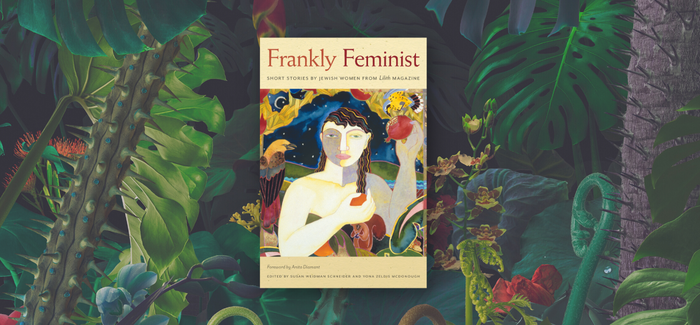Books
Powerful Short Stories From ‘Frankly Feminist’ Jewish Women
Frankly Feminist: Short Stories by Jewish Women from Lilith Magazine
Edited by Susan Weidman Schneider and Yona Zeldis McDonough (Brandeis University Press)
Like the brides in a Chagall painting, the images described in Lilith magazine’s collection of short stories float above the earth, surreal visuals that are nevertheless tethered to reality. There is the mikveh in the California woods where Orthodox women cleanse themselves of their secrets and pray for their fervent desires; a white satin chuppah under which a bride dreams of another (non-Jewish) man; the eggplants, potatoes, tomatoes and peppers that an Ethiopian immigrant to Israel cooks into a savory stew to make her new country feel like home.
Together, the stories create a powerful portrait of Jewish women’s experiences. They span a broad multicultural, cross-denominational and feminist scope as they explore relationships in which readers will encounter the “comfortably familiar and dangerously illicit,” the editors note in the prelude.
The 44 stories in the collection were selected from 200 originally published in the feminist Jewish magazine since its founding in 1976. Divided into six sections—Transitions, Intimacies, Transgressions, War, Body and Soul, To Belong—the stories teem with women’s insights on life, from conception to Kaddish.
Yiddish author Esther Singer Kreitman—Isaac Bashevis Singer’s sister—writes from the perspective of a newborn in “The New World,” translated from the Yiddish by Barbara Harshaw. The baby hears her mama say, “Of course I would’ve been happier if it had been a boy.”
“I listen to all of this,” the baby thinks, “and it is very sad for me to be alive. How come I was born if all the joy wasn’t because of me!” In her real life, Kreitman’s mother destroyed all her early writings for fear that they would make her unmarriageable.
In many of the stories, characters use their voices to demonstrate their independence as risk-takers and rule-breakers. The seemingly mundane activity of two Orthodox teens putting on makeup is tinged with sexual taboo in Elena Sigman’s “Face Me.” In “Flight,” Phyllis Carol Agins traces 80-year-old Hanina’s journey backward from the present—living with her son in Philadelphia—to her escape from her policeman husband’s restrictions in France when she was 37 then to her time spent wandering the Arab market and baking bread with her mother in Algeria at age 13.
These are stories that will stay with readers. They are alternately fraught with emotion and lightly lined with humor and tenderness; stained with antisemitism and filled with the ultimate human desire to belong.
Rahel Musleah, a frequent contributor to Hadassah Magazine, runs Jewish tours to India and speaks about its communities.











 Facebook
Facebook Instagram
Instagram Twitter
Twitter
Leave a Reply